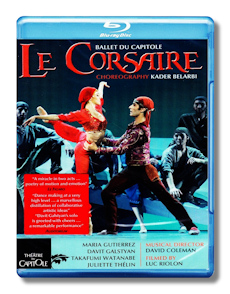
The Internet's Premier Classical Music Source
Related Links
- Adam Reviews
- Latest Reviews
- More Reviews
-
By Composer
-
Collections
DVD & Blu-ray
Books
Concert Reviews
Articles/Interviews
Software
Audio
Search Amazon
Recommended Links
Site News
 Blu-ray Review
Blu-ray Review
Adolphe Adam

Le Corsaire
- Maria Guttierez - the Slave-girl
- Davit Galstyan - the Corsair
- Takafumi Watanabe - the Sultan
Ballet du Capitole de Toulouse
Orchestre National du Capitole de Toulouse/David Coleman
Opus Arte Blu-ray OABD7140D LPCM Stereo DTS-HD Master Audio
Also available on DVD OA1129D: Amazon - UK - Germany - Canada - France - Japan - ArkivMusic - CD Universe - JPC
In the 19th century it was standard practice to alter, edit, reorder and interpolate scores written for ballet productions. Even Tchaikovsky who never allowed others to chop up his music didn't escape it; after his death his first ballet Swan Lake was revived in a staging which radically restructured the score and added other parts of his piano music orchestrated by Riccardo Drigo. Contrary to the recent trend in ballet productions which tries to go back as much as possible to the sources (similar to the period performance movement in baroque/classical music, the original choreography, dramaturgy, stage design as well as the music are sourced), to this very day scores are still rearranged at will to suit the desires of choreographers and producers. This is not an easy undertaking, as one needs to confront and do better than guys like Tchaikovsky, Delibes or even lesser gods like Adam, Minkus and Pugni, and they usually knew quite well what they were doing. That not everybody is up to it is painfully proven again by this new production of Adolphe Adam's Le Corsaire featuring the French Ballet du Capitole de Toulouse. Premiered in 2013, the production is now released on DVD and Blu-ray by Opus Arte.
While created for the Paris Opera in 1856, it is by way of the Russian productions from the late 19th century that Le Corsaire (inspired by Lord Byron's poem) has survived. In its best form (best demonstrated by Moscow's Bolshoi company) this ballet is a grand, large-scaled extravaganza, boasting exotic locales, colorful characters, dramatic developments (including a spectacularly staged storm and shipwreck), some melodramatic touches but also a fair amount of humor, and above all a strong choreographic inspiration to carry the three-act ballet forward. Unfortunately, this new production in Toulouse, bravely recreated from scratch by artistic director Kader Belarbi, offers little of those ingredients. Gone are most of the familiar elements (like the famous "Jardin animé" scene), while what is left is something of a poor man's version of Le Corsaire, which might as well be called Sinbad in the land of boredom. In an interview printed in the booklet Belarbi states he wanted to create "a version for our age" (and surely that has to include the depiction of a rape scene.) Yet neither his uninvolving new plot – basically about a harem favorite resisting her master to replace her with a new girl – nor his classically inspired choreography are distinguished enough to replace what's been thrown out. The costumes are agreeable and traditional, yet the minimalistic sets overexpose the dancers and reduce the theatrical impact of the ballet (at least on the TV screen) even further. As said, the music by Adolphe Adam was orchestrated anew, rearranged and expanded with pieces borrowed from (why oh why?) composers as varied as Jules Massenet, Edouard Lalo, Anton Arensky, and even Jean Sibelius. As music supervisor, the British conductor David Coleman (who himself composed bits here and there to join the seams) naturally guaranteed a unified sound, but the whole thing nonetheless falls flat as a patchwork score offering little true complement to the dance. The whole ballet feels as a succession of numbers without dramatic cohesion or sense of purpose. In short, one big shipwreck of a Corsaire.
Suffice it to add that although the Ballet du Capitole is not without merit (especially Davit Galstyan in the title role is a superb dancer, and he deserves better), the overall leisurely pace holds little frills or thrills.
Generally well filmed (but overlaying images of orchestral soloists in the pit during the performance is not a good idea), the Opus Arte Blu-ray offers fine image and sound available in LPCM Stereo and DTS-HD. There are no extras, but the booklet includes short interviews with Coleman and Belarbi. And for whom it may interest, there is a detailed analysis of who did what of the score as arranged by Coleman.
Copyright © 2014, Marc Haegeman





















